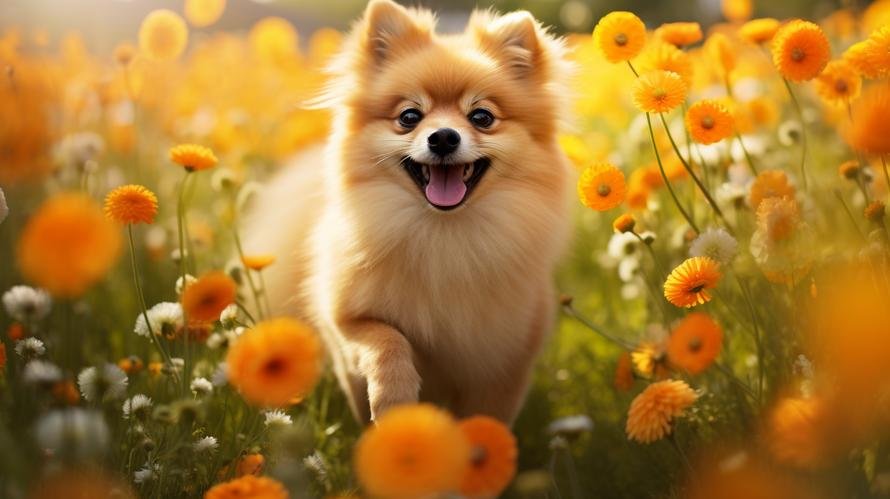Rev your engines, dog lovers, because we’re about to spill the kibble on a popular member of the fur society, the Pomeranian. These little balls of warm, fluffy hair might be small in stature, but they are mammoth when it comes to sass and spirit! Pomeranians, or ‘Poms’ as they’re lovingly referred to, are often seen parading in the arms of celebrities on the red carpet. But did you know they’re more than just a fluffy accessory? These petite pooches pack a real punch when it comes to intelligence, liveliness, and did we mention stubbornness? So, let’s answer the burning question in everyone’s mind – are Pomeranians easy to train?
First things first—picture the scene. You find yourself wandering down a garden path as a small pom-pom on legs prances towards you. Your heart strings are instantly tugged at by the hilariously playful and cute antics of this bouncy dog. Before you know it, you’re bundled over in fits of laughter. This is the “Pomeranian Effect”!
Pomeranian puppies are the heart robbers of the canine world. They are not just an adorable bunch of fur, but their radiant personality and exuberant spirit are infectious and compelling. With their fox-like faces, dark sparkling eyes, and fluffy coats, it’s easy to see why Pomeranians are one of the most beloved dog breeds. However, owning a Pomeranian is a commitment that demands a fair share of time, love, and most importantly, patience.
Many people think training a small dog like a Pomeranian is as easy as pie. However, the truth is that while Pomeranians are intelligent and quick learners, they are also notorious for their stubborn streak. Training a Pomeranian, or any dog for that matter, isn’t always a walk in the park. It requires dedication and consistency, but if done properly, it is definitely worth every second that you put into it. If you’re thinking of welcoming a Pomeranian into your home, being prepared for the training journey will save you countless hours of frustration, and enhance the bond between you and your new furry friend.
Before diving deep into training strategies, it’s important to understand a few things about a Pomeranian’s behavior. The spunky Pomeranian personality can be attributed to their lineage. Pomeranians are descendants of large sled dogs used in Iceland and Lapland, and the headstrong nature seen in these tiny popsicles is a reflection of their semi-wild ancestors. This lineage makes them fearless, curious, and independent; traits that are both a blessing and a challenge for owners trying to train these fluffy cotton balls.
The Pomeranian’s intelligence is a double-edged sword. While it makes them quick learners, it also gives rise to a sense of independence, which often results in a stubborn streak. Now don’t get disheartened! This doesn’t mean you can’t train a Pomeranian. Quite the contrary! With the right approach, patience, and consistency, you can effectively train your Pomeranian to be a well-behaved and happy member of your family.
One of the best ways to train a Pomeranian is positive reinforcement. These tiny furballs respond brilliantly to praise and rewards. Honoring good behavior with treats, toys, or just lavish praise will motivate them to keep up the commendable behavior. It also creates a positive association with the command, making it easier for your Pom to understand and learn quickly.
One of the first tasks in Pomeranian training is toilet training. The key to mastering it is to establish a routine. Feed your Pomeranian at the same time every day, and take them out to their “bathroom spot” first thing in the morning, throughout the day, and right before bedtime. Praise them when they eliminate outside and they will soon associate outside as their bathroom.
Leash training is another important part of Pomeranian training. These mini guardians are known to have a ‘big dog’ attitude, and getting them to walk peacefully on a leash can prove to be a challenge. It’s best to start leash training when they’re still young. Use a soft, lightweight leash and collar, and reward them for good behavior. Remember, short, frequent sessions work better than long, infrequent ones.
Another essential aspect of Pomeranian training is breaking unwanted behaviors like excessive barking. Pomeranians are one of the yappier breeds, and while it can be cute at first, it can also become a nuisance. To curb this, do not react when they bark. Instead, wait until they stop, then reward and praise them. This will encourage them to remain quiet and patient.
Pomeranians also tend to have a Napoleon complex. They forget their size and try to assert dominance over much larger dogs, which can get them in trouble. Training them to socialize and play nicely with dogs of different sizes and temperaments can greatly help in avoiding these situations.
Training a Pomeranian requires patience, consistency, and positive reinforcement. However, one must not forget that every Pomeranian has a unique personality, and what might work for one may not work for another. It is important to understand your Pomeranian, their temperament, and their habits, and modify your training methods accordingly.
Remember, the bond between you and your Pomeranian will greatly influence the training process. Spend quality time with them and make the training process fun and interactive. This will not only make training easier, but will also result in a well-mannered, disciplined, and cheerful dog who is not just a pet, but a bona fide member of your family.
To sum it up, Pomeranians aren’t the easiest to train owing to their stubbornness and ‘big-dog’ persona, but they’re certainly not the hardest. With the right approach, patience and motivation, you can have your Pomeranian learning tricks, following commands and being well behaved in no time. These cheeky little snowballs with their charming personalities, exuberant spirit and overflowing love are a joy to have around the house, and with good training, they can become even more endearing companions. Happy training!



